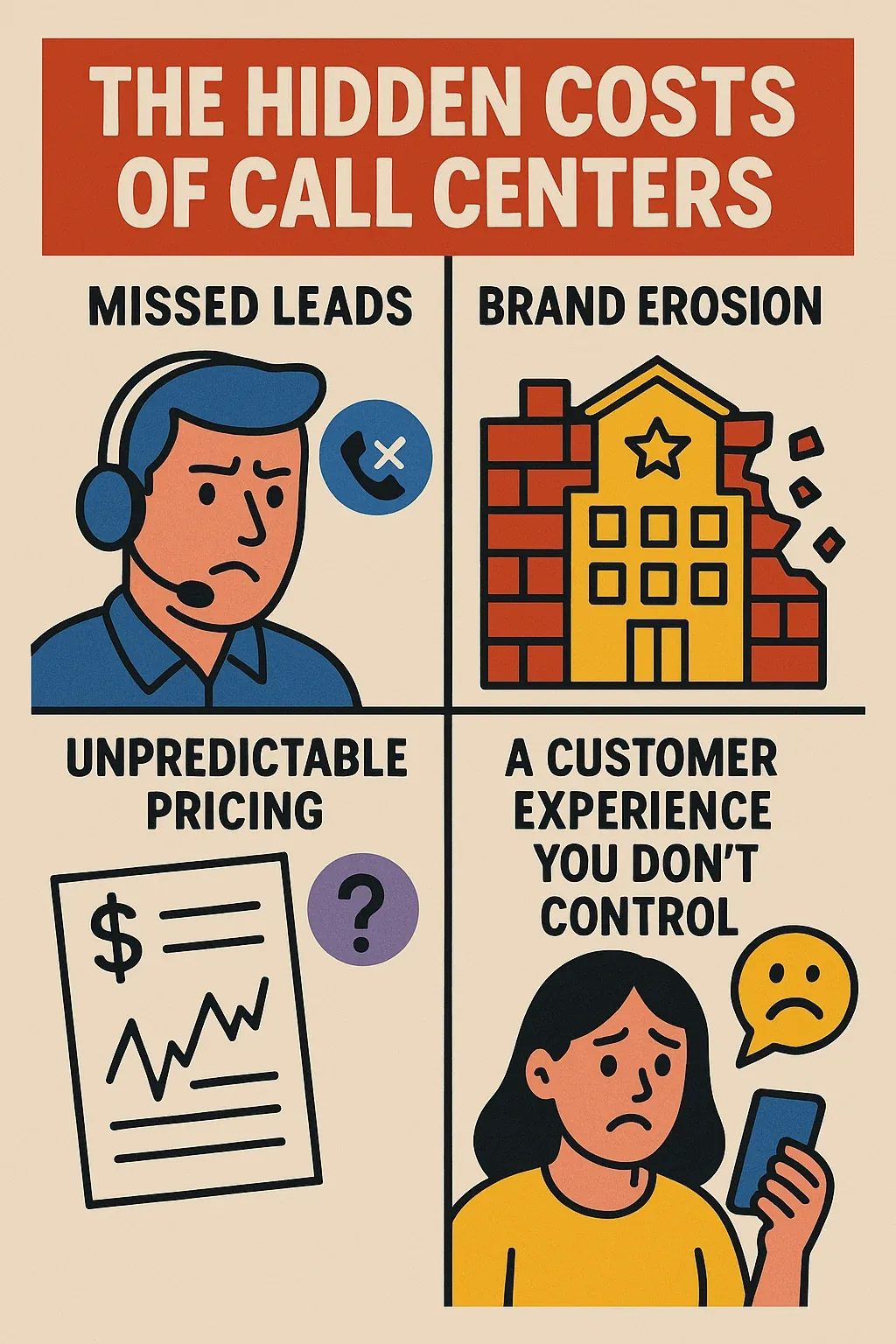When to Fire Your Call Center
For years, outsourcing your phones to a call center felt like a no-brainer. Someone else answers, you look professional, and business keeps rolling. But in 2025, the cracks are showing.

Call centers—both domestic answering services and offshore agents—come with hidden costs that most service businesses can’t afford: missed leads, brand erosion, unpredictable pricing, and a customer experience you don’t control.
Here’s the uncomfortable truth: most customers can tell when they’re speaking to a third-party rep. And it makes them trust you less.
Call centers are often juggling calls for dozens (sometimes hundreds) of businesses at once. Even the most well-intentioned agents are reading from generic scripts, mispronouncing names, fumbling service details, or just sounding…off.
“I could tell she wasn’t actually part of the company. It felt cold and disconnected.” — Verified Trustpilot reviewer, legal firm client
In industries like law, healthcare, and home services—where trust drives conversion—this is poison. You only get one shot on that first call. And if that voice doesn’t feel like your business? You’re done.
You pay call centers to catch your calls. But here’s what’s happening behind the curtain:
- • Long wait times = dropped calls
- • “Can I take a message?” = cold leads
- • After-hours coverage = often just voicemail in disguise
- • Overflow capacity = missed entirely if agents are busy with someone else’s business
Customers don’t stick around to see if you follow up.
One bad call and 78% of people say they’ll go elsewhere.
Not over time. Immediately.
And it’s not just theoretical:
A legal firm missing 3–4 consult calls a week could be losing $10–$20K/month in revenue.
A pest control company missing even 10 peak-season calls per week could be burning $50K/season.
Your phone is your pipeline. If your call center isn’t airtight, you’re leaking revenue.
Many outsourced services advertise round-the-clock support. But read the fine print:
• Some just record after-hours voicemails
• Some charge extra for nights and weekends
• Some “24/7” teams are a skeleton crew who can’t actually answer questions—just forward messages
Meanwhile, that message? It’s hitting your inbox at 7AM alongside 42 others. The customer who called at 11PM? They already booked with someone else.
“We’re paying for 24/7, but half the time they just say ‘We’ll have someone call you back.’” — Small clinic owner, Reddit thread
AI agents don’t sleep. Don’t forward calls. Don’t say “we’ll pass this along.” They just handle it—instantly.
Outsourced agents are trained to follow scripts. That sounds good—until it isn’t.
- • Can’t deviate to answer nuanced service questions
- • Can’t recognize urgency (e.g., “It’s an emergency” gets the same tone as “I’d like to schedule”)
- • Can’t empathize properly—especially with serious calls in law, healthcare, or repair
Even domestic services get this wrong. Many reviews call out inconsistent tone, robotic phrasing, or miscommunication as dealbreakers.
In contrast, AI agents don’t guess. They follow decision trees built for your business. They know what matters most, when to escalate, and how to handle every FAQ with confidence—and no attitude.
Let’s talk dollars.
- • Call centers average $2.70–$5.60 per call
- • That includes dead time: waiting, transfers, repeat questions
- • Some services charge onboarding fees, per-minute billing, and spike pricing for busy seasons
Now compare that to AI:
- • AI agents average $0.09–$0.30 per minute
- • No contracts, no busy-season markup, no limit on call volume
- • Most users see 85–90% cost savings compared to live agents
- • And AI doesn’t drop a call because it’s busy talking to someone else
You’re not just saving money—you’re finally scaling your phones without compromise.
We scanned hundreds of reviews across Trustpilot, Reddit, G2, and more. Here’s what comes up again and again for outsourced services:
“They took the call, but didn’t relay the urgency.”
“They mispronounced my name and didn’t know what we did.”
“The caller thought they got the wrong number.”
“The rep was polite but totally uninformed.”
“We had to fire them. Too many dropped balls.”
Even well-known services like Ruby, AnswerConnect, and Smith.ai get slammed for inconsistent agents and poor handoffs. And for small businesses, one bad call can be the one that ends up in a 1-star review.
Outsourced reps sound like a third party. AI phone agents sound like you.
Modern voice agents:
- • Use your brand tone and phrasing
- • Follow your workflows, not a shared script
- • Can answer or route calls based on urgency, service type, and customer profile
- • Never forget a policy, never leave a caller hanging, never put someone on hold to “ask a supervisor”
And unlike a call center, they scale infinitely. Peak season? No wait times. After hours? No voicemails. Holiday weekend? It still answers on the first ring.
This isn’t “just automation.”
It’s your best agent—trained, tireless, and always on-brand.
Call centers made sense when they were the only option. But now, we have better tools.
If your current provider is:
- • Missing calls
- • Mishandling leads
- • Getting complaints
- • Or quietly eating your budget
Then it’s time.
AI phone agents let you answer every call, sound like yourself, and scale your business without sacrificing trust, consistency, or cost.
You don’t have to fire your call center in anger. Just fire them for being obsolete.
👉 Ready to switch? Talk to us and we’ll show you what modern phone handling looks like.

